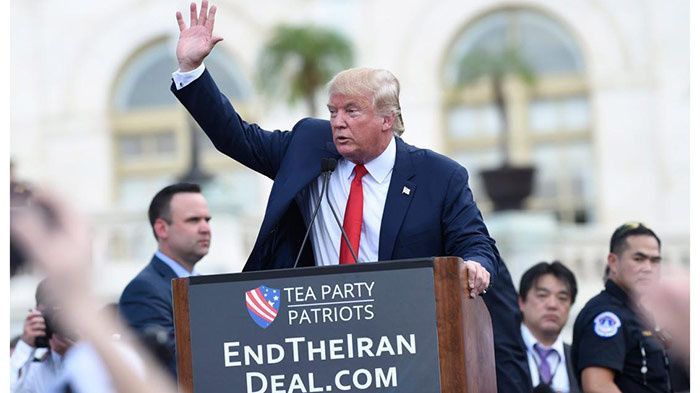Four Countermeasures for Tehran to Offset Trump’s Adverse Policies

With his slogan being ‘Make America Great Again’, Donald Trump set foot in the White House as the 45th President of the United States following his inauguration on Friday. From the very beginning, the victory of this billionaire in the presidential race sparked speculations over measures he would undertake in his early days in the Oval Office.
One such measure concerns the way he is going to deal with Iran and the nuclear deal between the country and the P5+1. Considering the fact that he has frequently criticized the JCPOA, saying he intends to renegotiate it, speculations indicate a rough road ahead of Iran in days and months to come. Nonetheless, Iran with a series of measures, Iran can counter Trumps’ efforts. These include:
1. Multilateralism
One of the most effective ways to counter measures by the new US President is to reinforce multilateralism in Iran’s foreign policy. In its political, security and economic aspects, multilateralism could undermine conditions for the United States’ coalition-building and political pressure against Iran. Iran has demonstrated itself as a significant, resolute, and highly capable player in regional issues and in the fight against ISIS terrorism. The country enjoys high economic and human potentials, rich energy resources, and a stable government. It has also sealed a nuclear deal with major powers that has been endorsed by the United Nation Security Council. These give it more significance among other powers, including European countries, Russia, China, Japan, Turkey, and India, making them more inclined toward expansion of ties with Iran.
Moreover, Europe has split ways with Trump’s policies regarding the nuclear deal, demanding the full implementation of the JCPOA and more regional cooperation with Iran, given the new potentials. Improved ties with European countries and more particularly the UK, Germany, and France could be effective. A list of common interests transcending mutual ties should be prepared and become operationalized. In the meantime, negotiations over differences should begin. These policies will even work in the short run while they could resolve many issues in the long, because the Europeans are also discontent with some US policies. Iran could use the opportunity to establish active relations with Europe and make the United States accept the other two powers, Russia and China. Under such circumstances, it will be impossible for the United States to isolate Iran. On the other hand, the fight against Daesh has made Iran and Russia closer in terms of security, magnifying Iran’s regional weight. Other countries like China, India, and Turkey are also rapidly expanding their economic ties and energy exchanges with Iran.
2. Détente with Regional Powers
Another strategic counter-measure for Iran is to reduce tensions with regional powers, particularly with the Saudi Arabia which plays a key role in the United States’ Middle East strategy. Easing tensions with the Saudi Arabia benefits Tehran as the Saudis are among key factors that lead to the adoption of anti-Iran policies by the US. This depends on Iran’s behavior. Iran’s regional foes, including Saudi Arabia, are spending billions of dollars to actively pursue their political and military alliances and alleviate relations with Israel. If Iran could find ways to reduce tensions with the Saudis, the Trump administration will be devoid of justifications within the US power and bureaucratic structure to increase political pressure on or threaten Iran with military action over the pretext of defending the Saudis and Persian Gulf states against the so-called threat of Iran.
3. Regional Equilibrium
The establishment of a regional equilibrium is required to contain Trump. Better results could be achieved if the US becomes involved in regional challenges against the Saudi Arabia and Takfiri terrorism. The status quo indicates that regional equilibrium is one of the best ways to combat Trump’s strategies, so that his first shot would target regional actors known as a ‘malignant cancer’ among the US President’s conservative colleagues. Daesh/ISIS, Al-Nusra Front, and Ahrar al-Sham could be considered the forefront of Saudi Arabia, the main player behind the expansion of fundamentalism and terrorism in the region.
Since conservative groups involved in US’ foreign policy see fundamentalism as the root cause of crisis in the Middle East, grounds will be prepared to identify Saudi role as the financial and spiritual supporter of these groups. In fact, in the years following the gradual decline of Iraq and Egypt, Saudi Arabia took a pivotal role in the US’ regional policies. Trump’s vision in fighting the threats will not be based on coalition with players like Saudi Arabia. In his efforts to change old paradigms, Trump will need to rely on diplomatic mechanisms with Iran.
4. The Power of Coalition Building
Iran’s improved political, security, and economic relations in multiple fronts will surely have an impact on Washington’s approach toward the country, affecting the former’s power of coalition-building in order to impose new sanctions or justify likely military threats in the international scene. At any rate, Iran could manage and control Trump’s America by expanding diplomacy in regional and international scenes and strengthening its power of deterrence and national economy in order to reduce its vulnerability. Since Trump’s foreign policy also incorporates a kind of pragmatism, US decision-makers could find the nuclear deal in their interest, based on a cost-benefit analysis. In the meantime, Iran should avoid being listed as a priority in Trump’s foreign policy because the approaches mooted by Trump’s team show that this would not expedient for Iran, particularly because Saudi Arabia and Israel are heavily investing and lobbying in Washington to turn Iran into a priority for the United States under Trump. This calls for a smart diplomacy under a balanced foreign policy.
* This piece was originally published in Donya-ye Eqtesad economic daily. The translation contains minor modifications.

